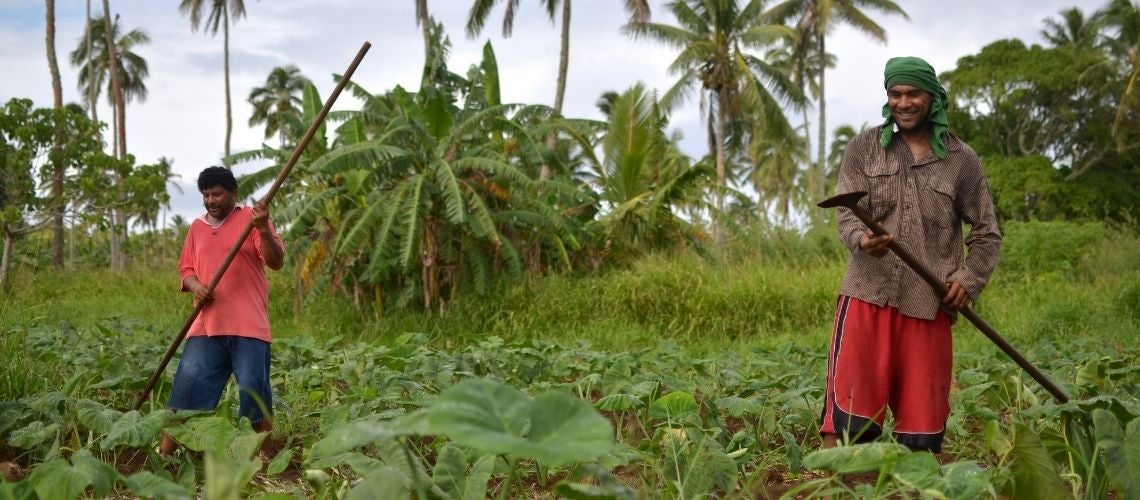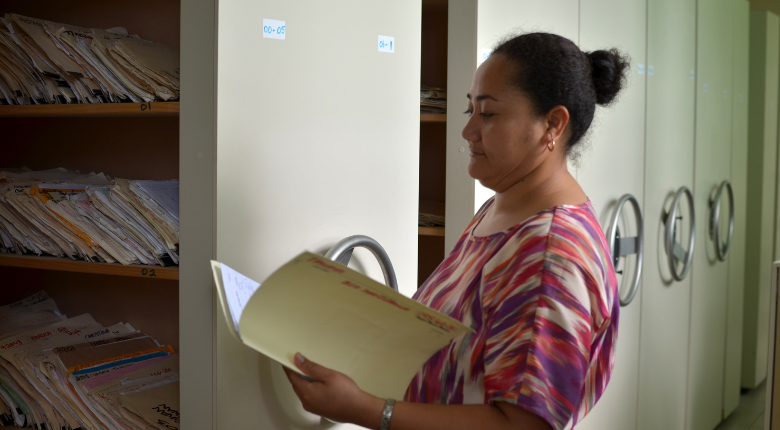 2 fishermen in Tonga
2 fishermen in Tonga
For people who spend their days in cities, the idea of living on a Pacific island likely invokes thoughts of people eating vast amounts of fresh, affordable seafood. However, this isn’t the case in some Pacific countries, such as Tonga.
Local fishing jobs and access to seafood, which comprises a traditional diet, are an important part of Tongan culture. But, for many years, the government of Tonga has been concerned about the health implications of a lack of available and affordable fresh fish in local markets, as well as the economic and food security challenges this posed.
In search of solutions, innovative government programs are working together to address this challenge and to improve food security and health and nutrition outcomes across the country. The World Bank has worked alongside the government to evaluate the impacts of these programs and provide in-depth analysis to help inform future decision-making.

Fishing policy
Despite being an island nation spread over hundreds of miles of ocean, in Tonga, fresh fish is more expensive to buy domestically than most other types of animal protein – fresh tuna costs TOP$7-15 (US$3.06 – US$6.57) per kilogram, compared to TOP$3 (US$1.31) for chicken. As is often the case in small island nations, the premium paid internationally for fish caught in Tongan waters is higher than what local fishermen can receive when they sell their fish at home.
So in 2016, the government introduced a new policy mandating that overseas fishing vessels can only receive a license if they sell at least five tons of their catch in Tonga at TOP$5 (US$2.19) per kilo. The policy resulted in a tenfold increase in the amount of fish available domestically, at the discounted rate, between 2016 and 2019. It has become such a popular initiative that the current supply cannot meet the demand for subsidized fish, especially in the outer islands. As a result, the government is expanding the program in 2021.
‘NCD tax’
As a result of local fish often being too expensive, Tongan families relied on cheaper, imported foods like corned beef, mutton flaps, and turkey tails for their protein needs. This exacerbated the already high rates of non-communicable diseases (NCDs) –such as diet-related diabetes, high blood pressure, and heart disease – amongst Tonga’s more than 100,000 citizens.
So the government imposed an ‘NCD’ excise tax in 2016 – among the first of its kind in the Pacific – targeting unhealthy foods such as mutton flaps, as well as sugar-sweetened beverages, and removed import tax on fresh fruits to provide healthier alternatives for families. Combined with cheaper local fish thanks to the fishing policy, the NCD tax has yielded positive results, including a decrease in the consumption of unhealthy products since its introduction.
While the two government programs implemented in 2016 had significant positive impacts, a World Bank study, supported by the governments of Australia, Japan, and New Zealand, together with the Food & Agriculture Organisation (FAO), TongaHealth, and the World Health Organization on the effectiveness of Tonga’s NCD taxation policy found that cost and availability were still significant barriers for people to change their behavior from consuming unhealthy, imported products to locally produced, healthier options.

Buy-back program
In March 2020, the risks from the COVID-19 pandemic forced the government to close Tonga’s borders. About 10% of Tongans engage in fishing activities, and 66% of them engage in fishing for sale. Due to the border closure, export markets became difficult to access almost overnight.
With the additional revenue raised through the NCD excise tax, the Ministry of Fisheries began purchasing fish wholesale from local fishing boats to sell to the public at the subsidized rate of TOP$5 (US$ 2.19) per kilo. This ensured that Tongans continued to have access to affordable fresh fish during volatile times, and that local fishermen could continue earning an income during the pandemic. Participation in the scheme saw an increase from five boats in May 2020 to 16 boats in July 2020, and the government is currently assessing how best to maintain the program in 2021.
While COVID-19 continues to generate global uncertainty and economic instability, these three policy actions show us that integrated, innovative solutions can work together to reduce food security risk in Pacific Island countries and improve health and nutrition outcomes for their people.




Join the Conversation